Drunken Master (1978)
Directed by: Yuen Woo-Ping
Written by: Lung Hsiao, Ng See-yuen
Starring: Dean Shek, Hwang Jang-lee, Jackie Chan, Yuen Siu-tien
Hong Kong
AKA AUI QUAN, DRUNK MONKEY IN THE TIGER’S EYE
AVAILABLE ON DUAL FORMAT BLU-RAY AND DVD: 24th April, from EUREKA ENTERTAINMENT
RUNNING TIME: 111 min
REVIEWED BY: Dr Lenera, Official HCF Critic
Young, mischievous Wong Fei-hung keeps on getting into trouble. His father decides to punish him for his behaviour by making him train harder in martial arts, picking as his new teacher Beggar So, who has a reputation for crippling his students during training. Wong flees from home in an attempt to escape his punishment and gets into a fight at a restaurant. An old drunkard nearby is drawn into the fight and helps him escape. He turns out to be Beggar So, the Drunken Master, who forces Wong into his brutal and rigorous training programme….
Despite the many great movies he’s made since, Drunken Master remains to me one of the highpoints of Jackie Chan’s career. Going against the grain, I even prefer it to his belated sequel Drunken Master 2, which may have been better from a technical standpoint but lacked the narrative flow and much of the humour of the original. It’s a film with one hand in the ‘traditional’ 1970’s martial arts movies, with most of the familiar cliches like rivalling kung-fu schools, a wayward hero, and intense training at the hands of an outsider, but also with one hand in the later comedy actioners that Chan made his trademark, efforts like Police Story, Project A and Rumble In The Bronx. Numerous diverse and intricately choreographed fight sequences, some laced with goofy humour but some not, are placed throughout the film, yet the story progresses reasonably well and some, if maybe not all, of the comedy does work. And in a way it’s one of the most subversive of martial arts movies. Think about it – our teacher and eventually our hero know a technique that requires the participant to basically get slaughtered beforehand – though of course it’s basically a comedy so I wouldn’t say that it’s necessarily advocating extreme drunkenness. It does, though, take the idea of fluidity, invention and adaptability in martial arts far further than even Bruce Lee was able to do so. Do whatever you need to beat your opponent, however daft it may seem.
Chan had been doggedly making movies throughout the 70’s, most of them for producer Lo Wei who’d brought Bruce Lee to stardom, but Wei never seemed to really know what to do with him, even in two comedies Half A Loaf Of Kung Fu and Spiritual Kung Fu, and Chan just didn’t really click with the public until Wei loaned him out to ex-Shaw Brothers director/producer Ng See-yuen who’d just found Seasonal Films. He gave Chan much more freedom to do what he wanted, and the result was Snake In The Eagle’s Shadow, which finally made Chan a box office draw. Writers Ng and Lung Hsaio drew very much on Snake In The Eagle’s Shadow for Drunken Master, even employing its director and some of its cast, as well as borrowing a bit from the Shaw Brothers flick Spiritual Boxer. Chan nearly lost an eye when Hwang Jang Lee kicked him in the head during the final fight scene. When Hwang became aware of this, he refused to do more takes for the shot so what you see on screen is Chan actually getting hit. Drunken Master earned two and a half time the amount of Snake In The Eagle’s Shadow, though some Chinese viewers were insulted by Chan’s portrayal of Wong Fei Hung. The film lost 15 minutes in some territories and countries including Japan. Unsurprisingly, there were quite a few imitations, and Yuen Siu-tien reprised his Beggar Ho character in Dance Of The Drunk Mantis, Story of Drunken Master and World of the Drunken Master. Chan eventually made Drunken Master 2 in 1994, and that film’s director Andy Lau then made Drunken Master 3 after falling out with Chan.
The first person we meet in the film is Yim Tit-sam, the main villain of the piece about to fight an opponent. It’s a joy for anyone with a guilty [or maybe not guilty – some of those films are very good despite the sometimes rudimentary filmmaking] liking for 70’s kung fu flicks to see or hear dialogue like: “You must be the Four Door Fist champion”. “Are you the man with the Devil’s Kick?” while two opponents face off in that familiar hilly locale just outside Hong Kong. Yim kills his opponent, and we switch to Chan as Wong Fei-hung, the same real-life Chinese folklore hero played by Jet Li, Andy Lau, and others – though never like this. It’s a busy but probably not typical day for him as he first humiliates an overbearing martial arts teacher. Next, he gets a pretty girl to blow in his eye and accidently kiss him to impress his friends, and is soundly thrashed by her older female guardian as a result [one of things that’s so refreshing about Chan’s Hong Kong films is that he’s just as liable to lose a fight as he is to win it], after which his shame is compounded when these two are later revealed to be his visiting aunt and cousin, whom he had not met before. Lastly, he beats up a hooligan who is the son of an influential man in town. His father decides to punish him for his behaviour by making him train harder in martial arts. His father subjects him to some extensive training, but Wong runs away and, starving, consumes a huge meal in a restaurant which he then refuses to pay for. Wong seems to be in trouble from his multiple opponents, but he didn’t notice the drunk sitting in the corner, who now comes to his rescue wielding his bowl of rice, chopsticks and a napkin to incredible use. The action has already been inventive, but it’s now taken to extremes of mind-blowing skill and striking originality.
This is, of course, Beggar Ho, intended to be Wong’s teacher, but Wong’s troubles are obviously just beginning considering that Ho says: “All students must learn how to fall before they learn how to fight”. The training scenes should usually be some of the highlights in a traditional kung fu film and Drunken Master certainly doesn’t disappoint while also showcasing Chan’s incredible physical strength. Perhaps the mind-boggling trial has him hanging upside down with an empty basket above his suspended feet, and two full buckets on the ground on either side of his head. He has to fill the empty basket with water using only the tiny cups he has in his hand. This means he needs to constantly do sit-ups while spilling any water. Unsurprisingly Wong keeps trying to run away but when he encounters and is defeated by Yim using just his feet, he decides to return. Meanwhile the owner of a rival school has told Yim to kill Wong’s father so he can access some coal in the hills nearby, while the assortment of opponents Wong has to face increase, usually with names like The King of Sticks and Iron-Head Rat [who basically fights with his head]. Along with dialogue that seems to actually pastiche the usual lines you hear or see in these films, one gets the impression that the film is lovingly mocking the traditional kung fu film at the same time as it’s trying to take it to another level, though sophisticated the humour is most certainly not – Wong even farts at an opponent during one fight, then knocks him face down into a pile of the brown stuff. It’s hard though to laugh at Ho, clearly a full blown alcoholic, having the shakes because he hasn’t had wine for a while.
Wong is already adept at using whatever’s at hand to battle an opponent, be it a bench or two cucumbers, but the numerous set-tos reach a truly high plane of audacity after Wong, who has already showcased several animal styles of kung fu, has learnt the moves of the Eight Drunken Gods – with a little help from a huge amount of wine – and has finally bonded with Ho in a rather sweet moment when they recite a [real] poem about drinking before Wong passes out. Wong begins to best opponents as he staggers about with a drunk’s gait but also showing how he’s less predictable and less susceptible to pain. It’s stupidly funny, yet Chan still somehow convinces as being extremely lethal – even when being the ‘Drunken Miss Ho Flaunting Her Body’ with exaggerated feminine mannerisms. Styles of drunken boxing do actually exist but they don’t tend to require actual alcohol consumption and the styles in the film seem to be partly invented, if based on certain other forms. Still, the 15 minute final duel [Chan’s second longest] is so great to watch because of the gulf between Chan’s seemingly all-over-the-place unpredictability and super kicker [he really puts Jean Claude Van Damme to shame] Hwang Jang-Lee’s mastery of traditional taekwondo.
The chemistry between Chan and Yuen Siu-tien, whose character is as cheeky and refreshing as Chan’s is considerable and it’s a shame they only made this and Snake In The Eagle’s Shadow together [in fact Yuen died not long after this film made him a star in his 60’s]. Cinematically Drunken Master is still a bit primitive, the direction of Yuen Woo-Ping being just adequate and some shots even being out of focus, though the “not too close up, not too far away” approach remains best for martial arts cinema so you properly see the moves and the techniques. These films often pinched music but all I noticed in Drunken Master was a tiny excerpt from the score to The Spy Who Loved Me, the rest of Chow Fu Liang’s score seeming to be original work. Some of the training is accompanied by a spaghetti western-style theme and then there’s an amusingly over the top piece with choir during one especially upsetting moment for Wong, which actually works fine because the film is kind of a send-up anyway. The famous and much re-used theme from the old Wong Fei Hung film series appears a few times and it’s hard not to get properly wound up in the best way during those moments. Newcomers to 70’s Hong Kong movies will have to put up with oddities which are familiar and indeed part of the fun to us fans, like the loud whip-cracking noise whenever someone throws or blocks a blow, and that wind cutting noise whenever someone throws a strike or moves their hands or feet. But Drunken Master is still probably one of the best introductions to this kind of film one can have, and after you’ve watched it you may be addicted. Though technically quite rough outside of the astounding fight sequences compared to slicker later efforts, I believe it’s one of the top three defining films of Chan’s career and belongs in every martial arts movie enthusiast’s collection.
Eureka’s release of Drunken Master comes from a 4k restoration by Sony which has already been used as the basis for the Japanese and Australian Blu-rays. I gather that the Japanese disc has some over emphasis of green which isn’t on the Eureka, so maybe Eureka have done a bit of tweaking. In any case, it’s a beautifully crisp and colourful print without losing any of the 1978 feel that it should have. And the film is in also in the right ratio unlike the Hong Kong Legends DVD which I used to own. Unfortunately Eureka weren’t able to obtain the original English language dub which was included on the Hong Kong Legends. This may be a disappointment to some fans [I personally love a good old crappy martial arts movie dub from time to time]. Maybe this was due to time or rights issues, I’m not sure. There is though another English dub to chuckle at though, a later one done for the US DVD. It really is bad with its goofy voices and poor delivery, and I only lasted a few minutes with it. The original Cantonese track is the way to go, though some may be more familiar with the Mandarin re-dub as it appeared on the Hong Kong Legends in place of the Cantonese. The Mandarin track defaults to English dubbing during some moments though, including the opening scene. Presumably this is because it was used for the cut version of the film – though come to think of it this is odd because the Mandarin track on the Hong Kong Legends was complete. Oh well, it’s not a major issue, and Eureka have included a selection of subtitle options including dub-titles and the amusing original theatrical release subtitles which are full of typos and grammatical errors [example – “where od you work”?], and which will be a wonderful flashback for folk like me who used to collect Hong Kong movies on video and they’d often be full of such things.
I seem to remember the 2002 audio commentary by Hong Kong cinema experts Rick Myers and Jeff Yang being much criticised at the time, but I didn’t have any problems with it except for Myers saying that Chan played Bruce Lee’s Fist Of Fury character in New Fist Of Fury. Myers does claim that the film is missing bits that he remembers from his first viewing, though I wonder if that isn’t his memory playing tricks on him as I’ve never read of these cuts and the running time is the same as the uncut [not the cut] theatrical release. The two don’t provide an enormous amount of information, but there isn’t a single gap and there are few dull spots as they make some good observations and go on slight but relevant tangents like comparing US and Hong Kong martial arts movies.
The other special features begin with an interview with Chan which is taken from the Japanese Blu-ray. He seems a bit bemused by the fact that the film is still so popular and has trouble remembering details about it. He does, though, say that he’s been considering a Drunken Master 3 for some time but can’t come up with a story. Then we have the two new interviews. Gareth Evans talks with great enthusiam about how Chan influenced him and his work, while Eastern cinema expert [though not so much an expert that he’s not sure where Chan appears in Fist Of Fury] Tony Rayns [familiar from Arrow Video’s Takashi Miike releases] is certainly informative but waffles on a bit for the 40 minutes duration, thinks little of Lo Wei, calls Enter The Dragon “a bust”, and even questions whether Drunken Master should be in the Masters of Cinema series at all! A reasonably interesting though rough looking interview with Ng See Yuen is from the UK DVD, as is a deleted scene which is an extra Drunken Boxing training scene. It’s really good though probably wasn’t necessary. The’kicking showcase’ is just a couple of minutes of Hwang fighting from another film. Overall a good collection of extras though, and despite the odd niggle, easily the best release of Drunken Master so far. I wonder if Eureka will be able to get the rights to some of Chan’s other classics.
SPECIAL FEATURES
*Definitive transfer from 4K digital restoration
*The original complete Cantonese soundtrack, rarely heard on home video
*Alternate Cantonese, Mandarin and English dubbed audio options
*Newly translated English subtitles, as well as a variety of alternate subtitle options
*Audio commentary by Hong Kong film experts Ric Meyers and Jeff Yang
*Video interview with Jackie Chan
*New video interview with film scholar Tony Rayns
*New video appreciation by director Gareth Evans (The Raid film series)
*Deleted scene
*Original trailer
*PLUS: A special edition booklet featuring new writing on the film and archival imagery

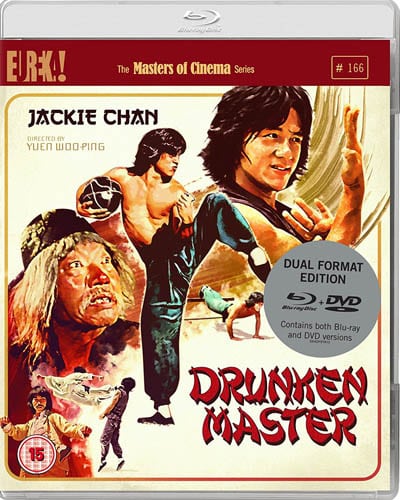
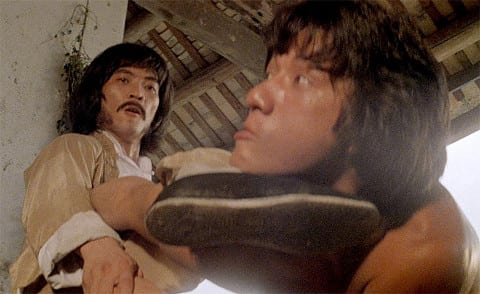





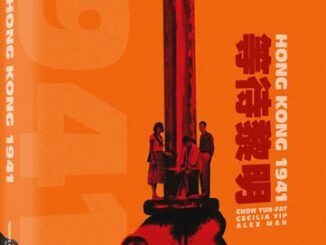
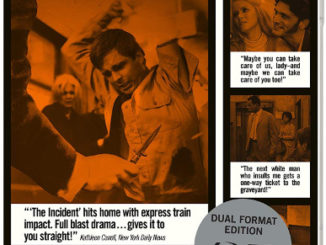
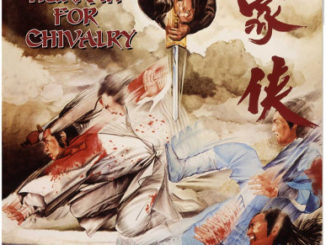
Be the first to comment